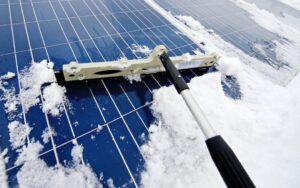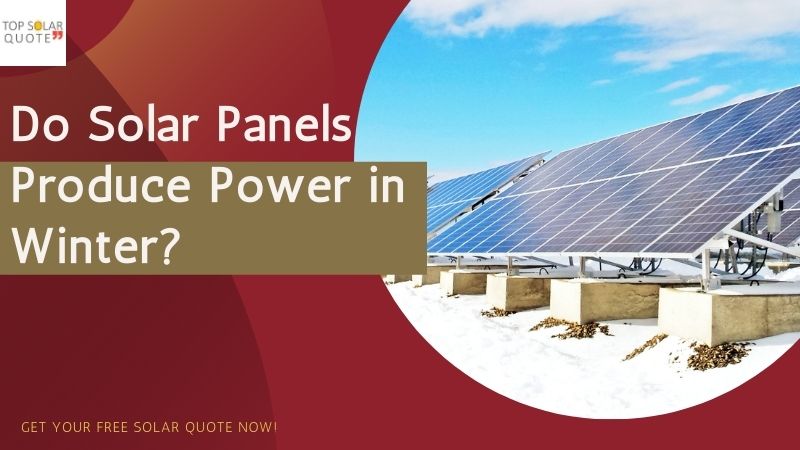Solar panel investors face a great challenge when determining the effectiveness of solar panels during winter.
Since there is minimal sunlight, and in some cases, rain, everyone wants to know that they can depend on the panels throughout the year for energy production.
Solar panels still produce energy during the winter, however their output reduces by 32% on average.
A winter day’s shorter daylight hours and sub-optimal angle of the sun result in a lower power output.
When designing or Installing Solar Panels In Winter, electricity production has been taken into consideration, so your power needs will still be met.
Moreover through this blog all the doubts regarding Do Solar Panels Work in Winter will be cleared!
How Do Solar Panels Work In Winter?
Because of shorter hours and a lower sun angle, winter reduces the efficiency of the solar panels; however, do cooler temperatures compensate for that? Yes, and no.
The lower the temperature, the better their efficiency.
Book a quote and get the top 3 accredited solar installers at your nearby.
In the presence of a temperature above 25 degrees Celsius, the Solar Panels Winter Performance begins to deteriorate. In every degree over 25, solar panel efficiency decreases by 5%.
Therefore, when the air temperature drops to 35 degrees, solar panel efficiency decreases by 5%.
During summer, the high temperatures reduce the efficiency of your panels, which affects their output. Nevertheless, the panels’ total output is usually lower in winter.
Do Solar Panels Work Better In Summer Or Winter?

Now that we have established that Solar Panels For Homes generate more power during the summer than they do in winter.
Let’s look at some of the factors that cause it, and the actual output figures of a solar system.
Hours In The Day
Solar panels generate more electricity when they’re exposed to more hours of sunlight.
During summer, starting late November to February, the days are longer, and thus solar panels get up to 6 more daylight hours. This translates to more electricity generation.
Solar Panels In Winter Months i.e. June to August, the days are shorter, and the sun is slightly lower. Therefore, your panels receive little daylight hours, and hence their energy output takes a hit.
Get the most affordable and best solar quotes in Australia!
Angle Of The Sun
As the sun shifts its position throughout the sky, the angle at which its rays hit your solar panels determines how much electricity they generate.
Generally, your panels will generate the most energy when they receive the sun rays directly.
In summer, the sun is higher, and so, sunlight reaching the panels is concentrated. This is why solar panels generate more electricity.
Throughout winter, the sun travels a bit slower, and so, the sunlight reaching the panels is widespread, covering large areas. This means that the direct rays landing on the panel are fewer.
#1. How Much Electricity Do Solar Panels Generate In Winter?
On average, most solar panels generate 32% less in winter than they do during the summer. This, however, is not due to the panels, but your location and light levels.
During summer, a 5-kWh solar system generates 21kW on average per day in Australia. (This may slightly vary depending on the states). In a month, this is almost 600kWh.
During winter, a 5-kWh system generates 5 x 2.6 = 14kWh per day. Monthly, this becomes 390kWh. This indicates a 35% less power production during winter.
#2. Do Solar Panels Work In The Snow?
Owing to their smooth surface and tilted fixtures, the snow easily slides off the panels without interfering with energy production.
Additionally, most of the panels in the market today were designed with pressure durability in mind. So, your panel can accommodate the weight of snow long enough for it to melt away.
Get Customised Solar Quotes In Australia!
#3. Does Efficiency Of Solar Panels In Winter Gets Affected?
While their efficiency is better during summer, one of the biggest issues with solar panels is their dependability.
If you live in an area that gets snowfall, your power production will drop to zero. The Solar Panels During Winter Storm cannot produce enough power as the snow blocks the light rom hitting the angles.
If you live in Sydney, your Solar Panels For Homes are exposed to 6 fewer hours of sunlight as opposed to summer.
Even with these fewer hours, this is not a huge issue as you can still generate enough power for your home.
#4. Does Less Solar Production In Winter Increase Energy Bills?
Not necessarily. Although your production is low, you can use net metering to ensure that your utility bills don’t skyrocket. This is done through the feed-in tariff.
The only real difference is how you heat or cool your home.
If you use an air conditioner through the summer but heat your home with gas or an open fireplace, then you will reduce your power bill anyway, so any drop in power production will be mirrored in your energy use.
As you produce power through the day, you can feedback excess into the grid and get credits for this power to use when the sun goes down.
Because you are not running an air conditioner while harvesting power (which saps most of your energy), you actually have more excess power to draw on at night. It all seems to balance out quite well.
Speak to your local installer about installing an oversized system. Instead of a 5kWh system, you can install 5 more panels and have a 6.6kWh system to pick up the slack.
Getting solar installations couldn’t be this easy earlier! Get free solar quotes…
#5. Summer And Heat Trade-Off With Solar Panels
On a hot summer day, you’d expect your solar panels to generate a lot of electricity. However, studies now show that too much heat is bad for your solar panel’s efficiency.
When your panel heats up to over the base temperature of 250C, its efficiency decreases by nearly 0.5% per degree.
During winter, your panels don’t go through this and hence their efficiency remains high.
The good thing about PV solar panels is that they are design to withstand even the harsh temperatures. By that we mean the Best Solar Panels Brands Australia that can operate at more than 800C hot and up to -400C cold. This means that the chances of heat damage to the panels are extremely low.
The panels only become hot and ‘overheat’ because of the silicon component of the PV cells. As it gets warmer, the cell’s voltage output decreases.
How To Take Care Of Solar Panels In The Winter?
Since your panels will be expose to very few sunlight hours in winter, you want to generate as much energy as possible. Here’s how to do this.
Keep Your Panels Clean

Even though your panels are in top shape during Autumn, you shouldn’t take your chances as winter approaches.
Find some time to clean your panels and get rid of any dirt on the panel surface. But avoid using harsh chemicals and abrasive tools when cleaning to protect the glass surface.
You should also prune any tree leaves and branches that might cause shading to your panels and do a complete system check to confirm that everything is working well.
Angle Your Panels To Face North
Since the sun is lower, angling your solar panels to face north allows them to trap more sunlight. You can check the Clean Energy Council for the precise combinations for plane angles depending on your city.
Reduce Energy Consumption
With your solar system producing less energy in winter, you won’t have the luxury of strutting around your home naked with the heating turned right up.
You’ll have to start regulating how much power you use per day. Find out the appliances consuming a lot of electricity and ensure that they’re on only when needed.
If you need to use high-consumption appliances like the dishwasher, refrigerator, and dryer, try to use them during the day while the sun is still producing a ton of electricity.
Get the best deals on solar systems in your budget!
Install a battery
During winter, your solar panels become very inconsistent in their electricity production due to the shorter daylight hours.
This means that you’ll have days when the electricity produced is lower than your home’s demand, – and that’s when you need a battery.
Installing a battery into your system allows you to store the excess energy the panels generate during a good day, taking you a step closer to energy independence.
Getting The Best Feed-In Tariff
Since your solar panels aren’t consistently generating enough power for your home, you will depend on the grid for the extra power.
So, to avoid large power bills at the end of the month, look for the best feed-in tariff rates in your area.
Good tariff rates will dramatically reduce your energy bills, and your positive net balance will be a small amount.
Myth Busted!
Hopefully this blog was enough to convince you guys that Solar Panels Works In Winter Efficiently.
Convinced you solar works through winter.
A combination of big solar and a thermally efficient home will result in pleasantly low winter bills and a cozy home to see you through the not particularly dark days of an Australian winter.
Looking For Solar Quotes In Australia??
We’re well into the 21st century with powerful digital tools at our fingertips, yet the solar equipment procurement process remains antiquated.
Most solar contractors and developers still have to visit multiple suppliers’ websites and/or call them—one by one.
They have to spend valuable time submitting multiple RFQ forms and have to request quotes via email to find the equipment they need… Some may turn to sites which aren’t tailor to the solar industry’s needs.
Who Are We?
Top Solar Quote is tailor-made for the solar industry to connect distributors and manufacturers with buyers.
It simplifies the process of submitting and responding to RFQs, allows buyers to see multiple prices from different potential suppliers, and allows suppliers to submit multiple bids.
Easing the procurement process for both sides. Thus if you are having a tough time in Choosing A Solar Provider Near You allow us to excel this task on your behalf.
Don’t run around requesting for quotes. Let quotes come to you!

